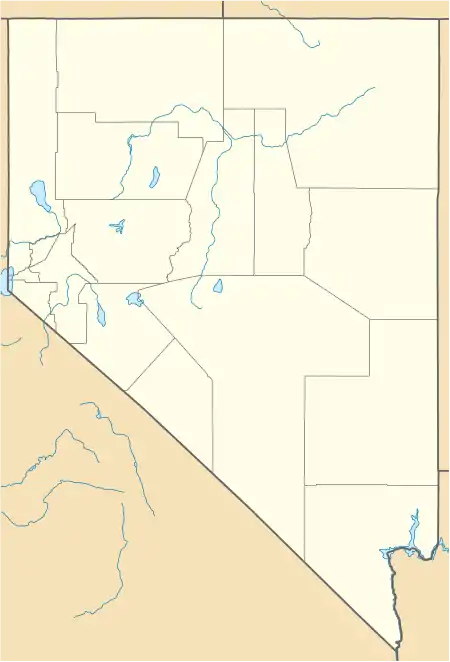Scossa, Nevada | |
|---|---|
 Scossa  Scossa | |
| Coordinates: 40°44′24″N 118°35′48″W / 40.74000°N 118.59667°W[1] | |
| Country | United States |
| State | Nevada |
| County | Humboldt |
| Elevation | 5,289 ft (1,612 m) |
Scossa was a small mining town, now a ghost town, located in Pershing County, Nevada.[1]
History
Gold was discovered in the northwest spur of the Antelope mountain range to the south of Scossa in 1930, by James and Charles Scossa.[2][3] Their claim, the North Star Mine, was later renamed and consolidated into the Dawes Gold Mine, Inc. Another large operation, the Hawkeye Mine, began operations in 1934, after a second large discovery of gold deposits. The mining town of Scossa serviced both of these mines, as well as others in the surrounding area.
By 1939 most of the gold and silver available to be mined in the Scossa mining district had been extracted, and the mining camp went into decline. Smaller gold and titanium mining operations, less successful, were continued as late as 1955; today, the site is completely abandoned.[4]
Location
One known building still stands at the site of the Scossa mining town. In addition, other debris and evidence of the town's existence still exists in and around the location, such as a large metal tank and other building materials.
References
- 1 2 3 U.S. Geological Survey Geographic Names Information System: Scossa
- ↑ Basso, Dave (1970). Ghosts of Humboldt Region. Sparks, Nevada: Western Printing and Publishing. p. 111.
- ↑ Federal Writers' Project (1941). Origin of Place Names: Nevada (PDF). W.P.A. p. 65.
- ↑ Bonham, Jr., H. F.; Garside, L. J.; Jones, R. B.; Papke, K. G.; Quade, J.; Tingley, J. V. (1985). OF1985-03: A mineral inventory of the Paradise-Denio -- and Sonoma-Gerlach Resource Areas, Winnemucca District, Nevada (Report). Nevada Bureau of Mines and Geology. pp. 150–151.
